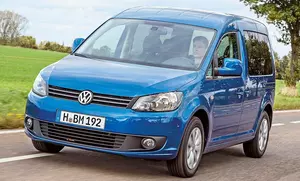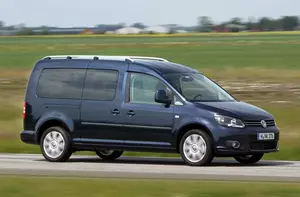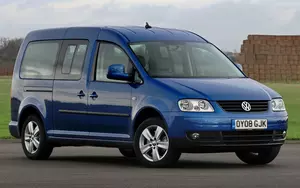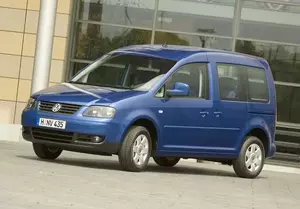
| Vehicle | Precise engine size | Difference from world average | Engine size to consumption ratio | Horsepower from 1 L | Engine size to 100 kg of weight |
|---|---|---|---|---|---|
| 2.0 TDI |
1.97 L (1968 cc) |
16.1% smaller | 36 cc to 1 mpg | 52 hp from 1 L | 141 cc to 100 kg |
| 1.0 TSI |
1 L (999 cc) |
57.4% smaller | 23 cc to 1 mpg | 102 hp from 1 L | 77 cc to 100 kg |
| 1.2 TSI |
1.2 L (1197 cc) |
49% smaller | 29 cc to 1 mpg | 70 hp from 1 L | 92 cc to 100 kg |
| 1.4 TSI |
1.4 L (1395 cc) |
40.5% smaller | 34 cc to 1 mpg | 89 hp from 1 L | 100 cc to 100 kg |
| Vehicle | 2.0 TDI |
|---|---|
| Precise engine size | 1.97 L (1968 cc) |
| Difference from world average | 16.1 smaller |
| Engine size to consumption ratio | 36 cc to 1 mpg |
| Horsepower from 1 L | 52 hp from 1 L |
| Engine size to 100 kg of weight | 141 cc to 100 kg |
| Vehicle | 1.0 TSI |
| Precise engine size | 1 L (999 cc) |
| Difference from world average | 57.4 smaller |
| Engine size to consumption ratio | 23 cc to 1 mpg |
| Horsepower from 1 L | 102 hp from 1 L |
| Engine size to 100 kg of weight | 77 cc to 100 kg |
| Vehicle | 1.2 TSI |
| Precise engine size | 1.2 L (1197 cc) |
| Difference from world average | 49 smaller |
| Engine size to consumption ratio | 29 cc to 1 mpg |
| Horsepower from 1 L | 70 hp from 1 L |
| Engine size to 100 kg of weight | 92 cc to 100 kg |
| Vehicle | 1.4 TSI |
| Precise engine size | 1.4 L (1395 cc) |
| Difference from world average | 40.5 smaller |
| Engine size to consumption ratio | 34 cc to 1 mpg |
| Horsepower from 1 L | 89 hp from 1 L |
| Engine size to 100 kg of weight | 100 cc to 100 kg |

| Vehicle | Precise engine size | Difference from world average | Engine size to consumption ratio | Horsepower from 1 L | Engine size to 100 kg of weight |
|---|---|---|---|---|---|
| 1.4 TSI |
1.4 L (1395 cc) |
40.5% smaller | 34 cc to 1 mpg | 89 hp from 1 L | 93 cc to 100 kg |
| 2.0 TDI |
1.97 L (1968 cc) |
16.1% smaller | 43 cc to 1 mpg | 76 hp from 1 L | 131 cc to 100 kg |
| 1.0 TSI |
1 L (999 cc) |
57.4% smaller | 23 cc to 1 mpg | 102 hp from 1 L | 71 cc to 100 kg |
| Vehicle | 1.4 TSI |
|---|---|
| Precise engine size | 1.4 L (1395 cc) |
| Difference from world average | 40.5 smaller |
| Engine size to consumption ratio | 34 cc to 1 mpg |
| Horsepower from 1 L | 89 hp from 1 L |
| Engine size to 100 kg of weight | 93 cc to 100 kg |
| Vehicle | 2.0 TDI |
| Precise engine size | 1.97 L (1968 cc) |
| Difference from world average | 16.1 smaller |
| Engine size to consumption ratio | 43 cc to 1 mpg |
| Horsepower from 1 L | 76 hp from 1 L |
| Engine size to 100 kg of weight | 131 cc to 100 kg |
| Vehicle | 1.0 TSI |
| Precise engine size | 1 L (999 cc) |
| Difference from world average | 57.4 smaller |
| Engine size to consumption ratio | 23 cc to 1 mpg |
| Horsepower from 1 L | 102 hp from 1 L |
| Engine size to 100 kg of weight | 71 cc to 100 kg |

| Vehicle | Precise engine size | Difference from world average | Engine size to consumption ratio | Horsepower from 1 L | Engine size to 100 kg of weight |
|---|---|---|---|---|---|
| 2.0 TDI |
1.97 L (1968 cc) |
16.1% smaller | 44 cc to 1 mpg | 76 hp from 1 L | 123 cc to 100 kg |
| Vehicle | 2.0 TDI |
|---|---|
| Precise engine size | 1.97 L (1968 cc) |
| Difference from world average | 16.1 smaller |
| Engine size to consumption ratio | 44 cc to 1 mpg |
| Horsepower from 1 L | 76 hp from 1 L |
| Engine size to 100 kg of weight | 123 cc to 100 kg |

| Vehicle | Precise engine size | Difference from world average | Engine size to consumption ratio | Horsepower from 1 L | Engine size to 100 kg of weight |
|---|---|---|---|---|---|
| 1.2 TSI |
1.2 L (1197 cc) |
49% smaller | 32 cc to 1 mpg | 88 hp from 1 L | 86 cc to 100 kg |
| 1.6 TDI |
1.6 L (1598 cc) |
31.9% smaller | 36 cc to 1 mpg | 64 hp from 1 L | 107 cc to 100 kg |
| 2.0 TDI |
1.97 L (1968 cc) |
16.1% smaller | 53 cc to 1 mpg | 86 hp from 1 L | 123 cc to 100 kg |
| 1.6 |
1.6 L (1595 cc) |
32% smaller | 55 cc to 1 mpg | 64 hp from 1 L | 106 cc to 100 kg |
| 2.0 |
1.98 L (1984 cc) |
15.4% smaller | 73 cc to 1 mpg | 55 hp from 1 L | 124 cc to 100 kg |
| Vehicle | 1.2 TSI |
|---|---|
| Precise engine size | 1.2 L (1197 cc) |
| Difference from world average | 49 smaller |
| Engine size to consumption ratio | 32 cc to 1 mpg |
| Horsepower from 1 L | 88 hp from 1 L |
| Engine size to 100 kg of weight | 86 cc to 100 kg |
| Vehicle | 1.6 TDI |
| Precise engine size | 1.6 L (1598 cc) |
| Difference from world average | 31.9 smaller |
| Engine size to consumption ratio | 36 cc to 1 mpg |
| Horsepower from 1 L | 64 hp from 1 L |
| Engine size to 100 kg of weight | 107 cc to 100 kg |
| Vehicle | 2.0 TDI |
| Precise engine size | 1.97 L (1968 cc) |
| Difference from world average | 16.1 smaller |
| Engine size to consumption ratio | 53 cc to 1 mpg |
| Horsepower from 1 L | 86 hp from 1 L |
| Engine size to 100 kg of weight | 123 cc to 100 kg |
| Vehicle | 1.6 |
| Precise engine size | 1.6 L (1595 cc) |
| Difference from world average | 32 smaller |
| Engine size to consumption ratio | 55 cc to 1 mpg |
| Horsepower from 1 L | 64 hp from 1 L |
| Engine size to 100 kg of weight | 106 cc to 100 kg |
| Vehicle | 2.0 |
| Precise engine size | 1.98 L (1984 cc) |
| Difference from world average | 15.4 smaller |
| Engine size to consumption ratio | 73 cc to 1 mpg |
| Horsepower from 1 L | 55 hp from 1 L |
| Engine size to 100 kg of weight | 124 cc to 100 kg |

| Vehicle | Precise engine size | Difference from world average | Engine size to consumption ratio | Horsepower from 1 L | Engine size to 100 kg of weight |
|---|---|---|---|---|---|
| 1.2 TSI |
1.2 L (1197 cc) |
49% smaller | 32 cc to 1 mpg | 88 hp from 1 L | 80 cc to 100 kg |
| 1.6 TDI |
1.6 L (1598 cc) |
31.9% smaller | 36 cc to 1 mpg | 64 hp from 1 L | 107 cc to 100 kg |
| 2.0 TDI |
1.97 L (1968 cc) |
16.1% smaller | 53 cc to 1 mpg | 86 hp from 1 L | 116 cc to 100 kg |
| 1.6 |
1.6 L (1595 cc) |
32% smaller | 55 cc to 1 mpg | 64 hp from 1 L | 106 cc to 100 kg |
| 2.0 |
1.98 L (1984 cc) |
15.4% smaller | 73 cc to 1 mpg | 55 hp from 1 L | 117 cc to 100 kg |
| Vehicle | 1.2 TSI |
|---|---|
| Precise engine size | 1.2 L (1197 cc) |
| Difference from world average | 49 smaller |
| Engine size to consumption ratio | 32 cc to 1 mpg |
| Horsepower from 1 L | 88 hp from 1 L |
| Engine size to 100 kg of weight | 80 cc to 100 kg |
| Vehicle | 1.6 TDI |
| Precise engine size | 1.6 L (1598 cc) |
| Difference from world average | 31.9 smaller |
| Engine size to consumption ratio | 36 cc to 1 mpg |
| Horsepower from 1 L | 64 hp from 1 L |
| Engine size to 100 kg of weight | 107 cc to 100 kg |
| Vehicle | 2.0 TDI |
| Precise engine size | 1.97 L (1968 cc) |
| Difference from world average | 16.1 smaller |
| Engine size to consumption ratio | 53 cc to 1 mpg |
| Horsepower from 1 L | 86 hp from 1 L |
| Engine size to 100 kg of weight | 116 cc to 100 kg |
| Vehicle | 1.6 |
| Precise engine size | 1.6 L (1595 cc) |
| Difference from world average | 32 smaller |
| Engine size to consumption ratio | 55 cc to 1 mpg |
| Horsepower from 1 L | 64 hp from 1 L |
| Engine size to 100 kg of weight | 106 cc to 100 kg |
| Vehicle | 2.0 |
| Precise engine size | 1.98 L (1984 cc) |
| Difference from world average | 15.4 smaller |
| Engine size to consumption ratio | 73 cc to 1 mpg |
| Horsepower from 1 L | 55 hp from 1 L |
| Engine size to 100 kg of weight | 117 cc to 100 kg |

| Vehicle | Precise engine size | Difference from world average | Engine size to consumption ratio | Horsepower from 1 L | Engine size to 100 kg of weight |
|---|---|---|---|---|---|
| 1.6i |
1.6 L (1598 cc) |
31.9% smaller | 57 cc to 1 mpg | 64 hp from 1 L | 100 cc to 100 kg |
| 1.9 TDI |
1.9 L (1896 cc) |
19.2% smaller | 56 cc to 1 mpg | 55 hp from 1 L | 119 cc to 100 kg |
| 2.0 TDI |
1.97 L (1968 cc) |
16.1% smaller | 53 cc to 1 mpg | 71 hp from 1 L | 116 cc to 100 kg |
| Vehicle | 1.6i |
|---|---|
| Precise engine size | 1.6 L (1598 cc) |
| Difference from world average | 31.9 smaller |
| Engine size to consumption ratio | 57 cc to 1 mpg |
| Horsepower from 1 L | 64 hp from 1 L |
| Engine size to 100 kg of weight | 100 cc to 100 kg |
| Vehicle | 1.9 TDI |
| Precise engine size | 1.9 L (1896 cc) |
| Difference from world average | 19.2 smaller |
| Engine size to consumption ratio | 56 cc to 1 mpg |
| Horsepower from 1 L | 55 hp from 1 L |
| Engine size to 100 kg of weight | 119 cc to 100 kg |
| Vehicle | 2.0 TDI |
| Precise engine size | 1.97 L (1968 cc) |
| Difference from world average | 16.1 smaller |
| Engine size to consumption ratio | 53 cc to 1 mpg |
| Horsepower from 1 L | 71 hp from 1 L |
| Engine size to 100 kg of weight | 116 cc to 100 kg |

| Vehicle | Precise engine size | Difference from world average | Engine size to consumption ratio | Horsepower from 1 L | Engine size to 100 kg of weight |
|---|---|---|---|---|---|
| 1.4 |
1.39 L (1390 cc) |
40.8% smaller | 46 cc to 1 mpg | 58 hp from 1 L | 93 cc to 100 kg |
| 1.9 TDI |
1.9 L (1896 cc) |
19.2% smaller | 49 cc to 1 mpg | 55 hp from 1 L | 135 cc to 100 kg |
| 2.0 ecoFuel |
1.98 L (1984 cc) |
15.4% smaller | - | 55 hp from 1 L | 124 cc to 100 kg |
| 1.6 |
1.6 L (1595 cc) |
32% smaller | 55 cc to 1 mpg | 64 hp from 1 L | 114 cc to 100 kg |
| 1.4 16V |
1.39 L (1390 cc) |
40.8% smaller | 48 cc to 1 mpg | 54 hp from 1 L | 99 cc to 100 kg |
| 2.0 SDI |
1.97 L (1968 cc) |
16.1% smaller | 53 cc to 1 mpg | 36 hp from 1 L | 141 cc to 100 kg |
| Vehicle | 1.4 |
|---|---|
| Precise engine size | 1.39 L (1390 cc) |
| Difference from world average | 40.8 smaller |
| Engine size to consumption ratio | 46 cc to 1 mpg |
| Horsepower from 1 L | 58 hp from 1 L |
| Engine size to 100 kg of weight | 93 cc to 100 kg |
| Vehicle | 1.9 TDI |
| Precise engine size | 1.9 L (1896 cc) |
| Difference from world average | 19.2 smaller |
| Engine size to consumption ratio | 49 cc to 1 mpg |
| Horsepower from 1 L | 55 hp from 1 L |
| Engine size to 100 kg of weight | 135 cc to 100 kg |
| Vehicle | 2.0 ecoFuel |
| Precise engine size | 1.98 L (1984 cc) |
| Difference from world average | 15.4 smaller |
| Engine size to consumption ratio | - |
| Horsepower from 1 L | 55 hp from 1 L |
| Engine size to 100 kg of weight | 124 cc to 100 kg |
| Vehicle | 1.6 |
| Precise engine size | 1.6 L (1595 cc) |
| Difference from world average | 32 smaller |
| Engine size to consumption ratio | 55 cc to 1 mpg |
| Horsepower from 1 L | 64 hp from 1 L |
| Engine size to 100 kg of weight | 114 cc to 100 kg |
| Vehicle | 1.4 16V |
| Precise engine size | 1.39 L (1390 cc) |
| Difference from world average | 40.8 smaller |
| Engine size to consumption ratio | 48 cc to 1 mpg |
| Horsepower from 1 L | 54 hp from 1 L |
| Engine size to 100 kg of weight | 99 cc to 100 kg |
| Vehicle | 2.0 SDI |
| Precise engine size | 1.97 L (1968 cc) |
| Difference from world average | 16.1 smaller |
| Engine size to consumption ratio | 53 cc to 1 mpg |
| Horsepower from 1 L | 36 hp from 1 L |
| Engine size to 100 kg of weight | 141 cc to 100 kg |